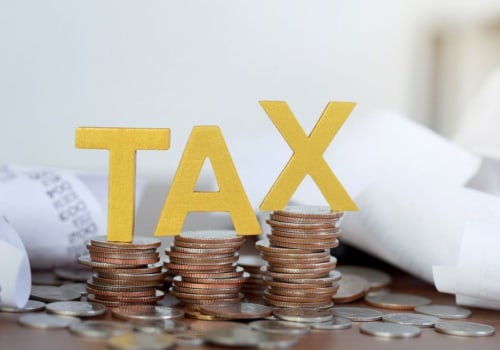Skylar Clarine is a fact-checker and personal finance expert with extensive experience including veterinary technology and film studios. Whatever the reason, if you fall behind on paying your taxes for reasons other than financial difficulties, it's important to reevaluate your tax payment plans. The price of negligence is too high; the IRS will pursue you and won't stop until you pay. Here is a more detailed list of reasons why otherwise conscientious people fall behind on their taxes.
One of the most common mistakes a taxpayer can make is not filing a tax return. However, if you live and earn income in the United States above a minimum threshold for a particular year, you must pay taxes and report that income by filing a federal tax return. By law, employers withhold taxes from your paycheck. What you may not know is that if not enough taxes are withheld from your paycheck during the year, you, the employee, are likely to owe the IRS when you file your tax return during tax season.
This is also known as underretention. It is usually triggered when an employee requests excessive exemptions on an IRS Form W-4 (completed at time of hiring). That means that not enough income taxes are withheld throughout the year. You can file a new W-4 form at any time.
And if you find that you've given too much to the government, they'll return the money when you file your income taxes. Another common form of late payment of taxes is linked to business owners and entrepreneurs. Most self-employed people are responsible for paying their own quarterly taxes, based on their income and estimated tax payments. Because they are self-employed, they don't have an employer withholding taxes from their wages, which is often an effective backup for people who would otherwise forget to file their taxes.
However, if you're self-employed and don't make your estimated tax payments throughout the year, you'll incur a significant tax liability at the end of the year. There are several ways to calculate your quarterly estimated tax payments. Just make sure that the method you choose doesn't make it difficult for you to cover everyday expenses or impose a huge tax bill and penalties for underpayments. The IRS often extends tax filing deadlines for victims of natural disasters.
You can check the IRS disaster relief announcements to determine your eligibility. It's not just self-employed Americans who are short on time, everyone is busy these days. Some other reasons why people may owe the IRS relate to what happens in their personal lives. A taxpayer may have a family crisis or an emergency that occurs around tax season that prevents them from filing a timely tax return or paying the tax bill in full.
In that situation, the IRS will issue the taxpayer a bill for the amount still due. Other taxpayers may simply misunderstand tax laws and request exemptions, deductions and credits that they are not qualified to apply for. In this situation, the IRS will normally contact the taxpayer and inform them of the error when reporting. Then, the taxpayer must validate the exemption, deduction, or credit obtained.
Without proof, the IRS will correct the taxpayer's tax return and the taxpayer could incur a significant tax liability plus a penalty and interest. An easy way to correct most reporting errors is to use tax software or hire an accountant. These resources will alert you to deductions relevant to your situation and reduce the number of errors. In any of the above circumstances, if the IRS believes that you owe overdue taxes, it will have no qualms about contacting you.
The IRS usually sends you a bill in the mail, but you may be contacted by phone. In serious cases, they may even try to visit you at work or at home. If the agency can't get you to voluntarily pay your tax debt, it can take steps to collect you. You have the authority to place a lien on your home and garnish your salary.
It will also add penalties and interest until your debt is paid. To avoid owing to the IRS, focus on motivating yourself and learn about your tax reporting and payment obligations. If you're ever unsure of your tax-filing and payment obligations, hire a professional tax attorney or tax preparer. Contacting the IRS directly for information is not a bad idea.
Above all, always be alert and always file your taxes on time, no matter what you owe. Larry Pon, owner of Pon & Associates, a San Francisco-based tax planning and financial advisory firm, points out that his best clients are planners and usually stay involved and aware of what's going on. That's good advice, but don't delay taking it. This is just one of many procedural changes that the IRS Revenue Institute instituted to help struggling taxpayers during this unusual period in our nation's history.
Another recent change, which will survive the pandemic, improves the “start from scratch” option offered by our Committed Offer (ICO) program. An ICO allows taxpayers to settle their tax debt for an amount lower than the total amount they owe. It may be a legitimate option for taxpayers who cannot pay their full tax obligations or if doing so creates financial difficulties for them. Households, or 61% of all taxpayers, paid no federal income taxes last year, according to a new report.
Some Republicans argue that the tax structure is already progressive and depends largely on the income of a small group of high-income people and top companies, while many Americans pay little or no taxes. The proportion of Americans who don't pay federal income taxes has been hovering around 44% for most of the past decade, according to the Tax Policy Center. Income tax breaks last year were small for many families, in dollars, Gleckman said. Federal income taxes don't include payroll taxes.
The Tax Policy Center estimates that only 20% of households paid no federal income taxes or payroll taxes. And almost everyone paid some other form of taxes, including state and local sales taxes, excise taxes, property taxes and state income taxes, according to the report. Do you have any confidential news? We want to hear from you. Get this in your inbox and learn more about our products and services.
You must agree to pay everything you owe within the 10-year statute of limitations, but you don't have to complete the extensive and intrusive IRS Form 433-F, Collection Information Statement. Maintaining and improving taxpayer compliance is important because small decreases in compliance cost the nation billions of dollars in lost income and shift the tax burden from those who don't pay their taxes to those who pay their fair share on time each year. If the taxpayer has only one federal tax liability (and owes no money to another federal or state agency) and is struggling financially, the IRS can waive compensation and issue the refund according to OBR procedures. However, if you have an accepted ICO and are unable to make your payments, you should contact the IRS and ask for help.
If you're not sure if you'll owe the IRS at the end of the year or get your money back, there's a fairly simple way to find out, according to Anjali Jariwala, certified financial planner, accountant, public accountant and founder of FIT Advisors in Torrance, California. Taxpayers in financial difficulty can also request a refund for omission of compensation (OBR) while the IRS is considering their commitment offer. Many Democrats say that the rich don't pay their fair share and cite a series of recent articles in ProPublica showing that billionaires like Jeff Bezos and Carl Icahn did not pay federal income taxes in certain years. To request a temporary delay in the collection process or to discuss your other payment options, contact the IRS at 1-800-829-1040 or call the phone number on your bill or notice.
. .



